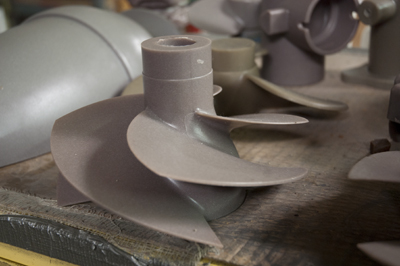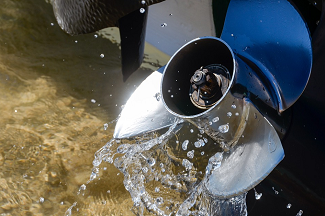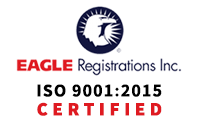Investment Cast Propeller Terminology
Propeller Terms to Know
Pitch
The linear distance that a propeller would travel in one revolution without slippage. Quality Castings offers both square pitch (pitch = diameter) and super pitch (pitch = 1.5 X diameter) MP series propellers.

Rotation
A propeller can be either left- or right-hand rotation, both of which can be operated in clockwise or counter clockwise directions. The hand of the propeller and direction of rotation will define the direction of the fluid, which is being moved by the propeller.

Pitch Face
The pitch face is the flatter of the two blade surfaces (see diagram above.) Always mount propeller with pitch face in the same direction as the moving liquid.

Rake
The fore or aft slant of a blade with respect to a line perpendicular to the propeller axis of rotation.

Skew
The transverse sweeping of a blade such that viewing the blades from fore or aft shows an asymetrical shape.


Valve
This small component controls the flow of liquid, gas, or fluids by an opening or closing motion. Constant-speed propellers are partially controlled by a pilot valve in order to maintain continual motion.

Impeller
A rotating component that is made to increase or decrease fluid flow and air pressure. Compressors, medical devices, mixer tanks, and even household machines have impellers that serve as the main operator.

Turbine
A rotating device that takes energy from element flow and converts it into power. Gas, water, and steam turbines are some of the more popular types of turbines.

Mixer
A device that blends or mixes all types of industrial materials, including food, mineral, and medicinal purposes. Mixers come in all shapes and sizes, depending on the job at hand.

Bearing Housing
Also known as a pillow block or plummer block; which gives support to rotating component. A bearing housing is typically made of iron or steel.

Drive Shaft
A part that delivers a rotation or twisting of other connected components, including a propeller; reaching a common goal. The drive shaft must have a lot of strength to endure stressed force.

Rotor
The part of a machine that rotates to power engines, blades, antennas, cranks, and more. A rotor encompasses dozens of industries, including chemistry, aeronautics, marine, and electric.

Hub
The center of a propeller that is connected directly to the drive shaft. A hub is typically made of either plastic or rubber.

Track
A term used for the difference of blade height compared to the others. The distribution between each blade depends on the targeted goal of mixing, blending, etc.

Ventilation
Air or gas is drawn into the propeller blades; resulting in lost speed as the propeller loses its grip with whatever it’s powering.

Cavitation
Type of damage done to propeller blade tips from collapsed bubbles. These bubbles are created from the negative pressure of torque and thrust; similar to opening a bottle of champagne.



Strut
A component that supports the propeller, shaft, and bearing. It must be strong enough to bear the weight load, as well as minimize vibrations.

RPM
The term means “revolutions per minute”, which is the rotational speed of a certain component. RPM is measured by a tachometer, keeping track of the amount of rotations in a motor or machine.







Stern Drive
A type of propulsion system, using the power of the inboard with the outboard drive.

Prop Slip
The difference between the theoretical distance(pitch) and the actual distance of the propeller after drag.

Angle of Attack
The angle at which a body mass and the passing flow come together to produce lift in the air.

Hole Shot
The rapid acceleration of a boat, from resting point or slower-speed, at which the engine and propellers work the hardest.

Feathering
Point at which the blades rotate directly parallel to the airflow. This is done to reduce drag and increase gliding distance.



